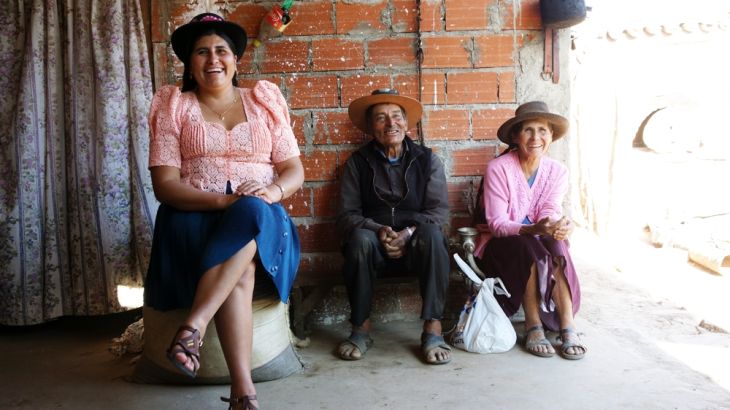
Rebel Geeks: The Citizens’ Network
How Bolivia is asserting its political and economic independence by setting up an entirely homemade Internet network.
After the Edward Snowden revelations, President Evo Morales said the United States was conducting electronic surveillance on “our most senior authorities” and stopped using his own email account.
Technology is a new way to colonise and enter countries.
This film investigates how Bolivian senator Nelida Sifuentes has led the campaign to restructure the way in which Bolivia and Latin America communicate, and restore power to ordinary citizens.
Keep reading
list of 4 itemsEcuador weighs security, international arbitration in latest referendum
‘Triple spending’: Zimbabweans bear cost of changing to new ZiG currency
Boeing hit with 32 whistleblower claims, as dead worker’s case reviewed
The tiny mountainous South American country has one of the world’s slowest Internet connections, but the senator is leading the drive to develop infrastructure and software that will make Bolivia digitally independent.
DIRECTORS’ VIEW
By Katharine Round & Leah Borromeo
How can people with the world’s worst internet set up a technological network independent of external corporate or governmental control?
Bolivia, with the world’s slowest internet, is working towards full technological sovereignty. This means creating an internet by Bolivians, for Bolivians. They also have hopes of training up generations of programmers and hackers who will turn the Latin American country into a technological producer instead of a consumer.
This David and Goliath struggle is what drew us to Bolivia and our protagonists Senator Nelida Sifuentes and hacker Luis Rejas.
Nelida is a 34-year-old local peasant community leader-turned-senator from a farming village outside the city of Sucre. Luis is a dog-loving bachelor from La Paz who spent most of his life in Marbella. In every practical sense, their dreams for an independent and free internet are an uphill climb.
What drew us to their story was the strength of their dream against the backdrop of a country and a people that have long been colonised and whose resources have been used and abused by successions of occupiers. The Spanish saw the mountains of Bolivia as literal goldmines and subjected its people to indentured labour over hundreds of years.
When the gold ran out, succeeding generations found more minerals to exploit. And as North America’s ideology and power began to eclipse the world through the gospel of capitalism, Bolivia once again saw itself in the position of forced reliance on powers more interested in its regulation than self-governance.
Despite the election of Evo Morales and the establishment of the plurinational state of Bolivia, which is seen by some as a kind of socialist and self-determinist wonderland, globalisation has found footholds in the hills.
Just over five percent of Bolivian households are connected to the internet, which compares with more than 40 percent in other South American countries. However, mobile internet masts are springing up, offering the world wide web on a variety of handheld devices. At present, 30 percent of the country has access to the internet and more than 17 percent of the population has a Facebook account. And because the cost of home internet is restrictive – some packages can cost nearly a quarter of the national minimum wage a month – the numbers of mobile users are climbing.
Despite a marketing push to increase internet access, the state-held telecommunications provider Entel faces many challenges meeting demands, not least laying the structure to build a fibre optics network that can support the nation’s communications needs. The growing mobile access market also means one thing – the people going online will be consumers, not producers. The average Bolivian will take what he is given and buy what he is sold.
This encroachment of corporate control is what Nelida and Luis are trying to thwart. They see technology as the next colonial frontier and are working with anyone from hackers to legislators to head multinationals off at the pass.
They want to train up generations of Bolivians who can write code and develop software. They are trying to establish a “sovereign cloud”, independent of international corporate and governmental control, that will protect the country’s data and speed up access and connectivity. Although they both use and support mobile internet platforms, they know that erecting more masts won’t solve the basic problem of structural integrity. They want full technological sovereignty and we are catching them as they build the architecture from the bottom up.
As we are filmmakers with an applied interest in power structures and the underdog, the idea of the world’s least technologically developed country taking on the Silicon Valley giants by refusing to play their game spoke volumes. It made us ask how much of ourselves and the freedoms we willingly surrender in the name of connectedness and convenience.
It made us turn the gaze on ourselves and scrutinise what it is about our global culture that prevents us from knowing what goes into how we communicate today. And it touched us that the extraordinary people in Bolivia, who are working against all odds for their digital freedoms are, at heart, unassuming and regular people.
It was a cerebral connection to autonomy and independence struggles that drew us in but it was Nelida’s character, Luis’s unwavering energy and their collective humanity that compelled us to share their stories.